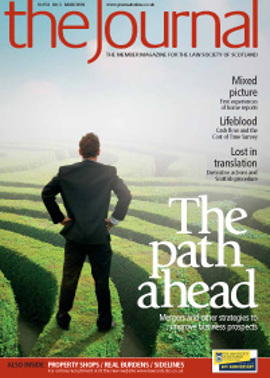Only half a step

“Fully embracing a digital future is a must for any successful knowledge economy.” So says (Lord) Stephen Carter, the Minister for Communications, Technology and Broadcasting, and author of the recently published 86 page interim report Digital Britain. The question has to be, “How will Britain prepare?”
The UK Government recognises that our digital economy has the ability to seriously influence our competitive position on the global marketplace. Digital and broadband technologies could bring enormous benefits to the UK economy and its citizens; however it is a cruel fact of life that Britain is already lagging behind on the digital technology and convergence front, a sad reflection of lost opportunities and lack of investment in our communications infrastructure. Despite the enormous growth potentials, there are tremendous technical challenges to overcome, and in the current economic climate you would not be alone in thinking matters will surely slip through the hands of the decision makers.
It has been estimated (Meadway and Mateos-Garcia, 19 January 2009, NESTA: www.nesta.org.uk/getting-up-to-speed/) that “the provision of universal super-fast broadband could directly create 600,000 new ICT jobs, with £18 billion added to GDP”, and significantly greater “indirect effects”. In the current economic climate such figures are very interesting to say the least; however providing fibre-optic infrastructure is expensive. A comprehensive analysis by the Broadband Stakeholder Group (BSG), an independent advisory body, estimates that the deployment of “fibre-optic cable infrastructure across the country that will deliver street-level access to super-fast broadband (50-100Mbps) will cost £5 billion”. This is a mere fifth of what the BSG estimate it would cost to provide fibre-optics to all homes across Britain.
Setting out the challenge
The issues and technical challenges that lie ahead are only in part addressed by the interim report. The financial investment in any of the ambitious plans laid out is in no substantive way addressed: the report suggests only the formation of a ‘’government led strategy group’’ to assess the likelihood of market investment in a new infrastructure project. Unfortunately nothing is surer that unless Britain tackles the issue head on, it will not secure its “place at the forefront of the global digital economy”, to quote the report, and will simply lag further behind our European, American and Asian counterparts.
The interim report was trumpeted by Government as setting out ambitious targets for the future. It makes a number of key points/recommendations, two of which, the targeting of those carrying out illegal file sharing (see panel), and the availability of bandwidth to all UK citizens, have been heavily publicised and criticised for a variety of reasons.
Setting out its comprehensive programme for Digital Britain, the report identifies five objectives for 2012 and a set of 22 actions which provide the platform on which the report is built.
These objectives, set out in the introduction, are:
“1. Upgrading and modernising our digital networks – wired, wireless and broadcast – so that Britain has an infrastructure that enables it to remain globally competitive in the digital world.
2. A dynamic investment climate for UK digital content, applications and services, that makes the UK an attractive place for both domestic and inward investment in our digital economy.
3. UK content for UK users: content of quality and scale that serves the interests, experiences and needs of all UK citizens, in particular impartial news, comment and analysis.
4. Fairness and access for all: universal availability coupled with the skills and digital literacy to enable near-universal participation in the digital economy and digital society.
5. Developing the infrastructure, skills and takeup to enable the widespread online delivery of public services and business interface with Government.”
New generation networks
Under objective 1, the interim report identifies that for the UK actively to participate and compete in the digital economy there is a need to upgrade our digital networks – wired, wireless and broadcasting. The first set of actions assesses the issue of ‘’next generation networks’’. The report states (p 14) that the “key question now is whether, as a nation, we can improve the capability and quality of our digital networks to meet growing consumer and business expectations, deliver what we need as a society and keep pace with international competitors”.
This statement (or question) is sadly somewhat typical of the interim report – surely the answer is, yes we can, and the question is really how will we fund it and how quickly can we get started!
One of the most important issues to be addressed is not “can we improve”, because we simply have to improve, but how will this new infrastructure look and how will it be funded. Lord Carter does not set out any clear solutions to this problem, nor does he set out the likely costs involved, leaving matters to be assessed by his suggested ‘’government-led strategy group’’, which will assess the likelihood of market investment in a new infrastructure project.
This group will consider proposals made by the likes of BT and Virgin, and assess how far these investments would go in securing a new network and the regulatory measures which may be necessary to facilitate or “underpin” market investments. At the moment the Government remains unwilling to commit to any public funding for such a project.
This is despite the recognition
(p 17) that “A number of other governments are including next generation networks in their infrastructure development plans… development of next generation digital networks is part of the new
US Administration’s growth package; Germany has sought to combine a measure of regulatory and fiscal incentives to encourage its main teleco to upgrade to fibre. Other governments are adopting innovative financial approaches to bring forward such upgrade investment”.
Case for intervention?
To be fair, in 2008 the Government commissioned the Caio Review to assess whether the delay in developing the new generation networks was impacting on our competitiveness in the marketplace; whether the Government should provide incentives; and if so, what. The interim report states that the Caio Review concluded “that the short term case for a major government intervention was limited”; and that “there was little evidence that UK customers would suffer a short term detriment.”
It is noted that Caio emphasised “in the short term” and warned of complacency, “stressing that broadband was important to quality of life and the competitiveness of the country, and that investment was not assured, being vulnerable to economic conditions and other developments”.
Welcoming recent investments by the likes of BT and Virgin Media, the interim report states (p 19) that Government will “continue to look… at what more can be done with industry to provide a framework that is supportive of those willing to engage their capital to establish enduring networks for the future”. I would contend that with the current economic nosedive, the Government will need to do more than simply this if we are in any way to come out of the recession in a position of strength.
Broadband services
Turning to the delivery of broadband services, Lord Carter has committed to delivering broadband to every home in the UK by 2012 at a speed of 2Mb/s, and stated in a speech on 24 February that leaving people out of the digital revolution is “not an option”.
This benchmark has been described as ‘’lacking ambition’’, and is seen by many as surprisingly low. This is hardly surprising given that the average broadband connection speed in the UK is already 3.6Mb/s (Ofcom Report, UK Broadband Speeds 2008, 8 January 2009), and with other European countries such as France and Germany rolling out fibre based networks you have to question whether this “action” will leave the UK lagging behind our European counterparts.
Whilst Lord Carter’s ambition to ensure all UK citizens have access to broadband services is laudable, you do have to ask a fairly fundamental question: do all UK citizens want access, and will they use it (or even a miniscule portion of it)? Will this Carter’s ambition be to the detriment of our economic growth and our serious users, who are demanding up to 50 and even 100Mb/s?
Clearly if such facilities are to be made available to all UK citizens, just who is going to encourage the public to take up and use these potentially new and improved broadband services? The report proposes the introduction of a ‘’digital inclusion champion’’, whose role will be to promote broadband use, and Lord Carter also suggests that the BBC take on a leading role in encouraging the public to connect to broadband.
Action points?
This is just the interim report, and feedback was due by 12 March 2009. There will of course be the finalised report in due course, with no doubt a raft of subsidiary consultations on the proposed regulatory reforms at least. The clock is ticking and Britain needs to grasp this opportunity and not delay unduly.
Peer-2-peer file sharing
There were concerns that the level of regulatory measures to be proposed would effectively require internet service providers (ISPs) to become policemen. Fortunately for ISPs, this has not materialised; however they are not totally without responsibility. The interim report proposes new legislation which will require ISPs to send a letter to illegal downloaders to inform them that they are committing an offence.
It gets more serious for ‘’repeat infringers’’: ISPs will be required to collect anonymised data of offenders and, under a court order, will have to make available to the rights holder, the personal details of such infringers along with the collected data. Copyright holders will then be able to pursue the infringers.
The necessity to provide what would be an attractive digital climate in the UK which would attract domestic and inward investment is naturally seen as a key factor in any growth of the UK digital economy.
In an attempt to build on the current memorandum of understanding amongst ISPs on illegal fire sharing, it is suggested that there should be created a ‘’Rights Agency’’. This agency would encourage both copyright holders and the distributors of works to cooperate in an effort to come up with solutions to the piracy problem and to move towards ‘’legitimate downloading.’’
In this issue
- Corporate governance in family businesses
- Que será, será….
- A matter of form in administrations
- You may have to be mad to work here
- No standing still
- A new regime for financial advice
- United we stand?
- Watch your local trend
- Cash flow: the five essentials
- Secure our future
- Opportunity lost?
- The kilt doesn't quite fit
- We can work it out
- Asset in recovery
- Law reform update
- Be your own money saving expert
- Skeleton crew
- Ask Ash
- Only half a step
- Learning experience
- Too late, too late?
- Variations and the three year rule
- Fruits of their labours
- Death of a claim
- All part of the game
- Scottish Solicitors' Discipline Tribunal
- Website review
- Book reviews
- Just whistle while you work
- Performance review






